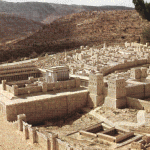The passage from Paul’s First Letter to the Corinthians for this 7th Sunday of Epiphany (February 20th) is chapter 3:10-11, 16-23. You can check it out on this link: http://bible.oremus.org/?ql=165132804
 As usual, Paul manages to pack a lot into very few verses. He’s taken us imaginatively into the world of construction to make a point about the foundations upon which communities of Christian discipleship should be. (Any resident of Quebec reading this passage should be forgiven for reading this with anything other than cynical suspicion about what can go wrong in the construction industry!).
As usual, Paul manages to pack a lot into very few verses. He’s taken us imaginatively into the world of construction to make a point about the foundations upon which communities of Christian discipleship should be. (Any resident of Quebec reading this passage should be forgiven for reading this with anything other than cynical suspicion about what can go wrong in the construction industry!).
In the middle of this extended metaphor about the church as a building, he says
“Do you not know that you are God’s temple and that the Spirit of God dwells in you?”
I suspect quite a few readers of this blog will have heard something like this reference before – “Your body is a temple of the Holy Spirit” – usually used to cajole us into not eating the fourth chocolate, or an appetizer AND dessert, but that’s a quote from later in Paul’s letter to Corinth, and has quite a different meaning than what’s intended here.
To the Corinthian community, the question “Don’t you know YOU’re God’s Temple” would have been a smack between the eyes. Corinth had more than its fair share of temples, to gods, goddesses, emperors and the like. All sorts of ‘stuff’ went on in those temples – sacrifices, offerings to appease this or that God, feasts and festivals, and… well, so on…(!) The members of this Community who were Jewish also knew fine well that the Temple was in Jerusalem. Inside this Temple was the inner sanctum – the Holy of Holies, understood by the Jewish faith of Paul’s day to be the dwelling place for God. So holy was God, and so holy was this space, that no human ever entered it except on one day of the year (Yom Kippur), and then it was only one man, the high priest who was allowed to enter.
All sorts of ‘stuff’ went on in those temples – sacrifices, offerings to appease this or that God, feasts and festivals, and… well, so on…(!) The members of this Community who were Jewish also knew fine well that the Temple was in Jerusalem. Inside this Temple was the inner sanctum – the Holy of Holies, understood by the Jewish faith of Paul’s day to be the dwelling place for God. So holy was God, and so holy was this space, that no human ever entered it except on one day of the year (Yom Kippur), and then it was only one man, the high priest who was allowed to enter. 
So, picture the sudden crick of the neck among Paul’s listeners when he asks them this question. “What?! Come again?? A temple where the One true God dwells? There’s only one, Paul, and it’s not in Corinth!” But that’s what Paul is saying. This community is the dwelling place – the temple if you will – where God’s holiness resides. An awesome statement in any generation. It pushes us to ask “So who is God that God chooses to dwell not in a golden sanctuary, but in the midst of human community?” “Who are we that God will choose to dwell with us?”
All through the Bible we have a building picture of a God who is decidedly different from the many religious options, of Ancient Egypt, Ancient Greece, Ancient Babylon, Persia, Asia Minor… Ancient Rome. Unlike many of these other gods, who tended to keep to themselves or to use humans and creation as dispensable playthings, this God of Abraham and Sarah, of Jesus and Paul, is a God who creates a humanity for partnership with God in creating and restoring justice and harmony for all creation. Moreover, this God chose Abraham’s people as a nation of blessing, and from among them he chose judges, prophets, shepherds, and ultimately the child of Mary of Nazareth to be God’s living, and reconciling and healing presence presence in the world. As heirs to the resurrected life of Jesus, the communities of Corinth, Ephesus, Rome, Thessalonika, and of Antioch, Rome, London, Geneva, and even Pointe Claire, also get to be the place where God chooses to live out God’s presence in the world.
We get to be “God’s Temple!” Not just because we have a building with a great green roof, with a snazzy website, and great people and super kids, and awesome programming, we get to be one among many many places where the Spirit of God dwells because that’s the way God gets to be present in the world.
Just in case that sounds overwhelming, or just in case we get a bit cocky, one last thought from the pen of Paul. Just before he asked the Corinthians “Do you know you are God’s Temple?” he reminded them that they were a bunch of rag-tag, very ordinary people, with ordinary human foibles as well as talents. He’s flip-flopped for two chapters between praising them for being ‘the saints’ filled with all manner of gifts, and criticizing them for their tendency to factionalism, or to laziness. In short, ordinary people we would recognize on any street, snow covered or otherwise. And it’s ordinary people – not superheroes, that God chooses for God’s dwelling place. That’s a promise.
And another short piece for further reflection on this notion of being a temple for the holy, read this short piece from the holy scriptures of Hinduism. Thoughts, reflections, responses are always welcome, either here, or by email.
The rich build temples to Shiva,
What shall I, a poor man, do?
O my Lord! my legs are the pillars,
My torso, the shrine,
And my head, the golden pinnacle!
Things standing shall fall,
But the moving ever shall stay!
Basavanna, Vacana 820
![546229_384999778191553_192734606_n[1]](http://cpuc.edublogs.org/files/2013/08/546229_384999778191553_192734606_n1-1jp0atd.jpg)
February 28, 2011 at 11:33 pm
Thanks very much for the historical background on this, Elisabeth. It is really helpful to understand the significance of Paul writing to the Corinthians that they are God’s temple. I definitely have interpreted this passage previously to be more pointing towards how we should take care and be gentle with our bodies as they are the temple where the Holy Spirit dwells. It is encouraging to be reminded of how God dwells within each one of us. I think we can sometimes feel such a deep longing for the Holy that we go looking in old churches or by a quiet lake but recognizing that the Spirit lives in us allows us to become grounded and access the Holy wherever and whenever.
I really have trouble understanding what Paul’s message is in verses 3: 21-23. My guess is that the Corinthians have been saying that some of them belong to Paul, some to Apollos, and some to Peter so Paul is trying to show them that they are not divided, and that they all belong to Christ. Could you offer some insight on this? Thanks!